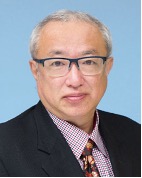
Prof.
Mitsuhiro MAEDA
Epistemic Research Institute of Social Ethics (ERISE) is the one of the OPI (Open Institute) of Advanced Institute of Industrial Technology (AIIT), Tokyo Metropolitan Government.
Now we are living in the Modern Civilization. All social phenomenon, both global ones and regional ones, can be analyzed as an expression of the stages of the modernization.
In the first half of the 21st century, the character of the stage of the modernization has come to a period of the great change. All people and organizations on this planet are required to precisely forecast the direction of changes of the stage of the modernization. If we fail it, our activities would be totally out of date, and many of organizations or institutions would, soon or later, collapse.
A guideline of grasping the direction of changes the stage of the modernization is called the ‘Social Ethics’ which ERISE is mainly researching. The Social Ethics is a kind of code of conduct coherent to the Social Philosophy of each stage of the modernization.
ERISE has established a special methodology of researching the Social Philosophy and extracting the Social Ethics from the Social Philosophy. ERISE adopts a methodology of Infosocionomics, especially a methodology of the Modernization Model of Infosocionomics in researching the Social Philosophy and extracting the Social Ethics.
Infosocionomics is a new academic modality of social science, established in the beginning of 21st century by Prof. Dr. Shumpei Kumon. The main target of Infosocionomics is analyzing the modern civilization and the process of the evolution of modernization. The Modernization Model of Infosocionomics is the key model of Infosocionomics.
Applied Infosocionomics is an academic modality, separated from Infosocionomics, specially organized to research policy implications of Informatized Society Building in developing economies. The international society of Applied Infosocionomics (Global Society of Applied Infosocionomics : Glo-SAI) has been established in 2021, Prof. Dr. Shumpei Kumon serves as the President, and Prof. Mitsuhiro Maeda (President of ERISE) serves as the Vice-President. ERISE has been serving as the Secretariat of Glo-SAI, and has been functioning as the global center of Applied Infosocionomics researches.
The Modernization Model of Infosocinomics shows the three-layered model of modernization, the nationalization layer, the industrialization layer and the informatization layer. All phenomenon in the modernization will be described as the super-imposition (convolution) of dynamism of those three layers.
The unique character of this model lies in the concept of informatization. Informatization is the development of an institutional infrastructure of social games seeking for the higher values, intelligence or wisdom (the Wisdom Game). The Modernization Model of Infosocionomics argues that institutional infrastructure development of this Wisdom Game (informatization) will play a fundamentally important role in addition to nationalization (institutional infrastructure development of the Power Game (social games seeking for power) and to industrialization (institutional infrastructure development of the Wealth Game (social games seeking for wealth).
The main research target of ERISE is the Wisdom Game, and its convolution with the Power Game and the Wealth Game. ERISE’s ‘E’ stands for ‘Epistemic’, and an ‘Epistemic research institute’ means that the research institute is based on the modality of Infosocionomics or Applied Infosocionomics, and the main research target is the epistemic issues, as an ‘Economic research institute’ means the research institute is based on the modality of economics, and the main research target is an economic issue.
ERISE advocates the philosophy of the Third Modernity and the Civilizational Diversity.
The First Modernity is the era that the Social Philosophy, which argues that only Whites or Europeans (developed states) could be able to be modernized, prevailed in the world. Surprisingly even today, people addicted this ‘white supremacy’ survive to some extent.
The Second Modernity is the era that the Social Philosophy, which argues that not only Whites or Europeans (developed states) but also some Asians and Africans (developing states) would be able to be modernized, but not all developing states, only ‘good students’ developing states which have completed many tough assignments, prevailed in the world. This Social Philosophy had prevailed until recently, or even is prevailing today. We can see the Washington Consensus compiled in 1989, or MDGs(Millennium Development Goals)adopted in 2000 in the General Assembly Meeting of the United Nations for typical examples of this Second Modernity philosophy.
The Third Modernity is the era that the Social Philosophy, which argues that all states on this planet without distinction between developed and developing states, between Europe and non-Europe, between races, should be able to be modernized, prevails in the world. The typical example of this Social Philosophy can be seen in the famous SDGs (Sustainable Development Goals), adopted in 2015 as the successor of MDGs in the General Assembly Meeting of the United States. The slogan of SDGs is ‘No One Left Behind’, and it clearly shows the philosophy of the Third Modernity.
In the era of the Third Modernity, all Asia/African states, even if they are in the ‘low income’ category at this moment, have a great ‘leap frogging’ chance to be the frontrunners in informatized society building, and thus to be seated in the leading position of the global society within a few decades.
Applied Infosocionomics analyzed this ‘leap frogging’ as the ‘multitude effect’. The concept of the ‘multitude’ is originally presented in the World System analysis by Antonio Negli and Michael Hardt.
The study of Applied Infosocionomics adopts this word to explain the ‘leap frogging’ mechanism as follows. In social systems of developed states, people are caught in the institutional nexus of incumbent stakes established in the old era when an old type technology was in place, and people cannot adopt the latest ‘disruptive technology (Christensen, Clayton)’ since incumbent stakeholders of old technology strongly oppose to adopting it. In social systems of developing states, on the contrary, people do not have the institutional nexus of incumbent stakes and thus will be able to easily adopt the latest ‘disruptive technology’ and develop informatized society building.
The ‘multitude effect’ in Applied Infosocionomics’ clearly explains the reason of miserable delay of informatized society building in Japan which has been revealed in dealing with covid-19 crisis. Most of the Japanese have come to understand that the society of Japan is the world ‘inferior’ one in the context of informatized society building. The cause of the Japanese tragedy has been brought by the opposition of super-strong incumbent stakeholders to adopt new technologies.
Based on this philosophy, ERISE is now undertaking various joint research projects with universities and governmental organizations of developing states in Asia and Africa.
No ERISE researchers think that Japan is ‘advanced’ and developing states are ‘inferior’. No ERISE researchers think that Japan should pathetically ‘help’ developing states. ERISE researchers think that Japan and developing states are now, at least, on the same rank, or even Japan will be soon overtaken by some of the developing states in informatized society building. The outcome of the joint research projects with ERISE and universities/governmental organizations in developing states would provide Japanese people good hope of the way of informatized society building in Japan.
We sincerely ask your higher considerations to support us, as the same the Third Modernity humans.
*for more information about Applied Infosocionomics, please refer the following text books.
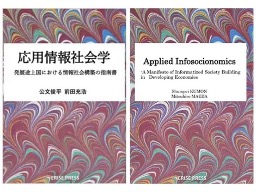
(You can purchase it in USD, EURO or GBP.)
At this moment, main project sites of ERISE activities are in Africa, in Central Asia and in ASEAN.
[Africa]
ERISE has been developing the following joint project with African universities/governmental organizations.
ERISE has been developing the project of compiling the Special Developmental Strategy inherent to 21st century Africa, with SADC-dfrc (Southern Africa Development Community – Development Finance Resource Center) and DBSA (Development Bank of South Africa).
In TICAD V held in Yokohama in 2013, ERISE and DBSA had agreed to launch this project, and held the joint workshop in AIIT in 2015. Prof. Mitsuhiro Maeda, President of ERISE, made a presentation of the outcome of this project at the TICAD VI Side Event Seminar in Nairobi in 2016. At the World DFI (Development Finance Institutions) Leaders Summit, commemorating the 50th Anniversary of Republic of Botswana, held in Gaborone in 2016, H.E. Patrick Dlamini, CEO of DBSA introduced Prof. Mitsuhiro Maeda as the researcher of this special developmental strategy.
In 2019, ERISE held the joint seminar with SADC-dfrc and Local Enterprise Authority of Republic of Botswana in Gaborone, the joint seminar with University of Eswatini in Mbabane, and the joint seminar with Sudan Science and Technology University in Khartoum.
In 2021, ERISE has launched the joint project of leading informatized society building over the whole African continent based on Applied Infosocionomics with Ekurhuleni Artisans and Skills Development College (South Africa).
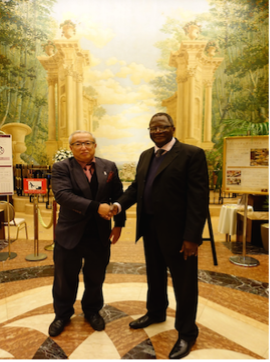
[Central Asia]
ERISE has been developing the following joint project with Central Asian universities/governmental organizations.
ERISE visited Kyrgyz and Kazakhstan in 2017, Uzbekistan, Tajikistan and Kyrgyz in 2019, and Uzbekistan in 2020 to hold joint seminars and dialogues on the topics of industrialization, informatization and modernization in those states.
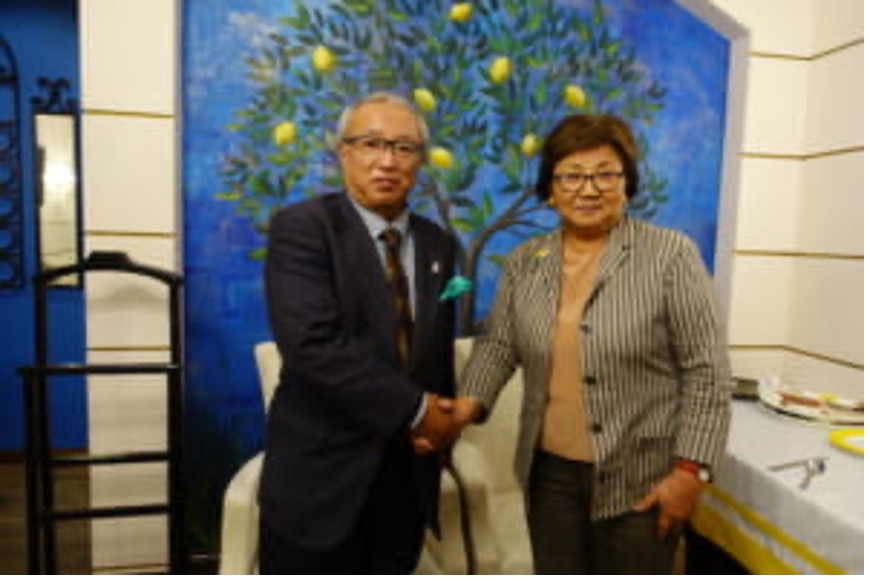
In Kyrgyz, Prof. Mitsuhiro Maeda met with H.E. Rosa Otonbaeva, ex-President of Kyrgyz Republic and agreed to develop a joint project on modernization of Kyrgyz between ERISE and Kyrgyz Republic, and ERISE and Investment Committee of the Office of President, Kyrgyz Republic signed MOU on this project. Investment Committee of the Office of President, Kyrgyz Republic invited Prof. Mitsuhiro Maeda to deliver keynote presentation at Industrial Roundtable of Kyrgyz (high-level meeting of government and industrial sectors). Prof. Mitsuhiro Maeda has been honored to be appointed as the Advisor to Investment Committee of the Office of President, Kyrgyz Republic in October 2019. ERISE has appointed Dr. Talaibek Kochumanov, Secretary General of Investment Committee of the Office of President, Kyrgyz Republic as Senior Research Fellow of ERISE in November 2019.
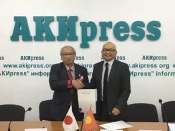
In Kazakhstan, ERISE held a joint seminar with Almaty University of Electric and Communication Technology in 2017. In Tajikistan, ERISE held a joint seminar with Tajik Technical University in 2019. In Uzbekistan, ERISE held joint seminars with Tashkent University of Information Technology in 2019 and 2010.
[ASEAN]
ERISE has been holding many seminars, workshops and developing joint research projects with universities/governmental organizations in ASEAN. ERISE has been developing ‘Global Seminar Caravan’, sequential seminars in various states on the same topic in many cities in ASEAN since 2017.
Some of the ASEAN states has shown high evaluation of these ERISE activities. In Cambodia, H.E. Son Koun Thor, State Minister attached to Prime Minister, delivered the ministerial letter to Prof. Mitsuhiro Maeda, stating that the government of Cambodia evaluates the activities of ERISE in Cambodia.
Prof. Mitsuhiro Maeda is now serving as Visiting Professor in University of Darma Persada (Jakarta, Indonesia) and Honorable Professor in HUBT (Hanoi University of Business and Technology, Hanoi, Vietnam).
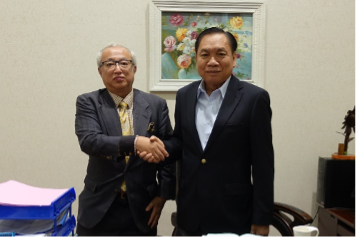
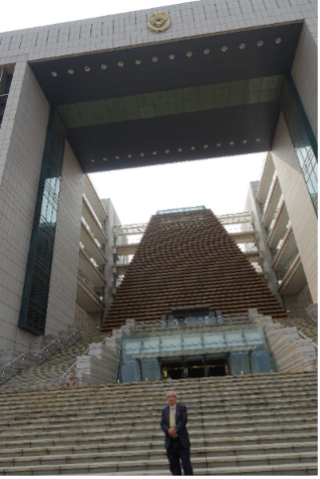
[CV of the President, Prof. Mitsuhiro Maeda]
Born in 1962. Graduating from Department of Law, University of Tokyo, Prof. Maeda has stepped up so-called ‘ a Revolving Door Career Path’ between the Government and Academia. In the Government of Japan, he served various positions including Director for International Finance, and Director of Financial Cooperation Division, Ministry of Economy, Trade and Industry. In Academia, he served as Associate Professor of University of Saitama, Visiting Professor of Graduate Institute of Policy Studies (GRIPS), Visiting Fellow of the Royal Institute of International Affairs (Chatham House, UK), Visiting Fellow of Johns Hopkins University School of Advanced International Studies (SAIS, USA) and Visiting Fellow of University of Cambridge. He is now serving as Professor of Advanced Institute of Industrial Technology (AIIT) and Director for Foreign Affairs, Secretary General of APEN (Asia Professional Education Network), President of ERISE (Epistemic Research Institute of Social Ethics), and Vice President of the Global Society of Applied Infosocionomics (Glo-SAI).
